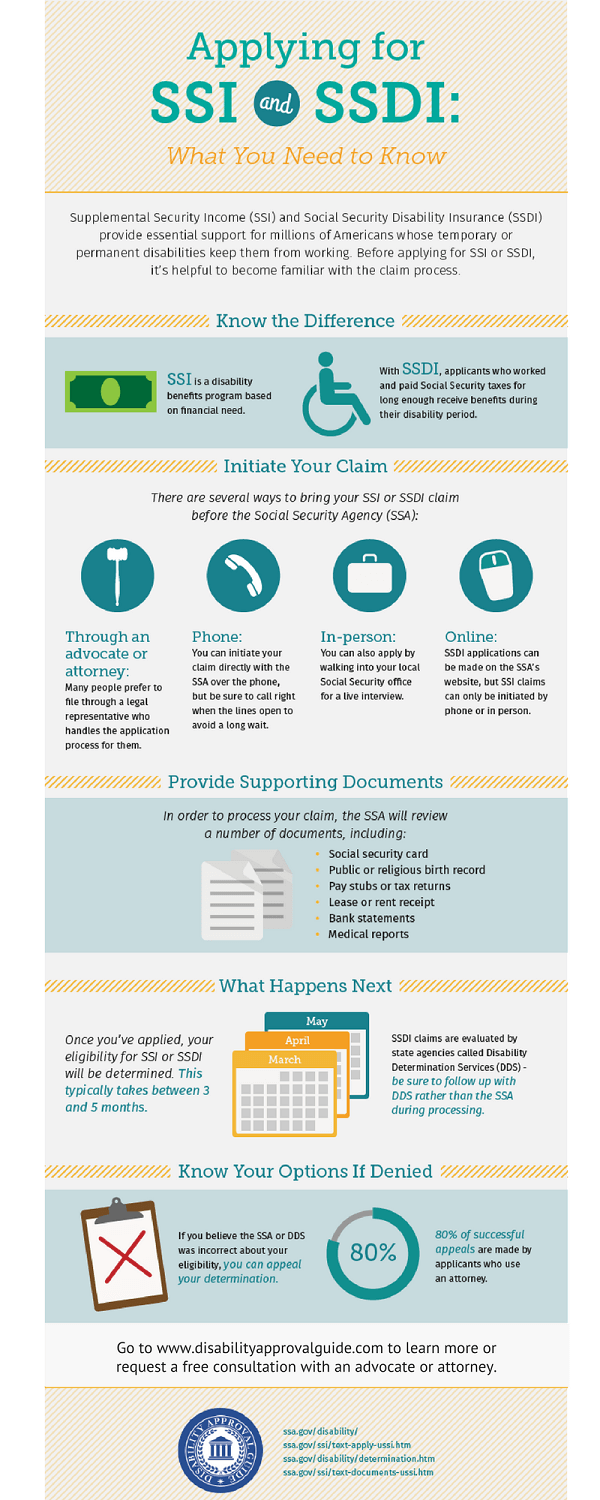Important: We updated this article in May 2022 with current SSA program policies and data. Millions of Americans have health problems that prevent them from working and earning money. Having enough income to pay bills can make you worry day and night. Needs vary across a wide range of disabilities, injuries, and circumstances. The Social Security Administration (SSA) created two programs — Supplemental Security Income (SSI) and Social Security Disability Insurance (SSDI) — to help those people financially. But with two programs comes two different sets of rules, qualifications, timelines, and more. This infographic helps you break down the differences, know what applies best to you, and tips for getting the benefits you need when you apply for SSI or SSDI.
How to Apply for SSI and SSDI: What You Need to Know

The SSA supports millions of Americans with disabilities each month through its SSI and SSDI aid programs. Yet not knowing the program differences, how to apply for SSI and SSDI benefits or how to appeal a claim’s denial can keep disabled Americans struggling financially.
6 Things Claimants Must Know Before They Apply for SSI or SSDI
1. The Difference Between the Two Programs
SSI is a disability program that calculates beneficiaries’ payments based on their financial need. SSDI is for those disabled Americans who have worked and paid into Social Security by having taxes withheld from work paychecks. If you haven’t work in 5 years or longer, you cannot qualify for SSDI. And if you earn more than $1,350/month in 2022, neither program will award you benefits.
2. How to Start Your Claim
Many choose to apply for SSI or SSDI with help from a Social Security disability advocate or attorney. A legal professional can easily handle your paperwork and provide additional assistance during the entire claim review process. You can also file your disability claim on your own through the phone, in-person at your local Social Security office or online. However, if a lawyer files your paperwork, it nearly triples your odds of benefit approval.
3. Supporting Documents to Include With Your Application
Both programs require applicants to provide specific documents that support their eligibility for benefits. These include your Social Security card, birth certificate, and recent pay or income tax records. Other information you must submit includes your bank statements and housing records (i.e., mortgage or rent payments, lease agreement, etc.). Perhaps most important of all are your current medical records. These will help the SSA evaluate how your physical or mental health issues limit your ability to work.
4. Understanding Next Steps After You Apply for SSI or SSDI
You don’t just receive benefits as soon as you apply for SSI or SSDI payments. The SSA must evaluate every individual disability claim, which can take a considerable amount of time. Disability Determination Services (DDS) are state agencies that examine all benefit applications and schedule independent medical exams. It’s important to follow up with either the SSA or DDS about your current disability application status once you file. In most cases, it takes at least 3-5 months to get a response after filing your disability application.
5. How to Appeal A Denied Disability Claim
Every person has the right to appeal within 60 days if the SSA denies them disability benefits. Attorneys greatly improve applicants’ chances of winning benefits during the appeals stage. In fact, Social Security attorneys handle 80% of successful disability appeals.
You May Qualify for Legal Assistance
When filing on your own, the disability benefits application process can be confusing, frustrating and even heartbreaking. That’s why so many Americans seek free legal consultations with local attorneys. Experienced disability attorneys and advocates can review your claim, help submit all required paperwork and even shorten your review and approval time. If you would like to apply for SSI, SSDI or need with your appeal, talk to an attorney for free.
Ready to see if you may qualify? Click the button below to start your free online benefits evaluation now!
Get Your Free Benefits Evaluation
Lori Polemenakos is Director of Consumer Content and SEO strategist for LeadingResponse, a legal marketing company. An award-winning journalist, writer and editor based in Dallas, Texas, she's produced articles for major brands such as Match.com, Yahoo!, MSN, AOL, Xfinity, Mail.com, and edited several published books. Since 2016, she's published hundreds of articles about Social Security disability, workers' compensation, veterans' benefits, personal injury, mass tort, auto accident claims, bankruptcy, employment law and other related legal issues.

